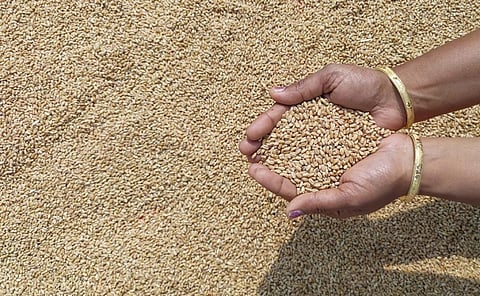

India’s sudden decision to ban wheat exports with immediate effect citing food security may prove costly for its farmers. Many of them have held back their crop in the hopes of getting higher prices in the coming weeks.
The impact of this decision is already being seen in wheat mandis (wholesale markets), which have seen a fall of Rs 50-100 per quintal on average since the morning of May 14, 2022.
“There is some panic after this notification. In mandis in Indore and Bihar, the wheat price went down by Rs 100 after the order. Traders have also slowed their buying activity. The milled quality wheat in Indore’s mandis was Rs 2,225 per quintal yesterday (May 13) and today (May 14) was sold at Rs 2,100 per quintal. This is a fall of Rs 125 per quintal. A Rs 50-100 fall has been recorded on average,” Shlok Joshi from Mandi Central, an agriculture commodity information platform, said.
Wheat prices in the private market have been ruling much above the MSP (minimum support price) of Rs 2,015 per quintal and farmers across the major wheat-producing states of Punjab, Madhya Pradesh, Haryana, and Uttar Pradesh have been stocking their harvest and bringing it in instalments in the hope that wheat prices will keep on increasing in the coming days.
Experts called the wheat ban a knee jerk reaction by the Union government. They said this was especially because just a day before this order, on May 12, the government had stated it would send trade delegations to Morocco, Tunisia, Indonesia, the Philippines, Thailand, Vietnam, Turkey, Algeria and Lebanon for exploring possibilities of boosting wheat exports from India.
India had earlier hoped to export 10 million tonnes of wheat and capture the global market made available after the Russian invasion of Ukraine. It had forecast a record output of 111 million tonnes. The sudden decision comes on the heels of an expected sharp fall in government wheat stocks.
The fall has been caused due to low wheat production after high temperatures in March resulted in the shrivelling of wheat grains, thus impacting the quantity of the crop.
Also, farmers stayed away from government procurement this time as they were getting high prices in private trade.
“The government had estimated the production of 110 million tonnes. But right now, it looks like the production is not even 100 million tonnes. This fall in output of more than 10 million tonnes is a major driver behind this decision,” Mohit Upadhyay, a major wheat trader, said.
The procurement figures fell to a 15-year-low this time, as only 18 million tonnes have been bought so far in the 2022-23 marketing season, against 43.3 million tonnes in 2021-22. The government procurement is mostly done in April and May.
Upadhyay said a lot of stocking was happening even at the end of businesses which have not traded in wheat before.
“Since wheat prices were ruling, businesses like Reliance, Aditya Birla and others which have not been active in wheat, also started buying it. Active stocking of wheat resulted in mills not getting any wheat to process,” he said.
Experts said the government must have realised that the production was much below than what it had estimated earlier. But the sudden move may result in panic buying, thus leading to a fall in prices for farmers.
“There was an expectation of a MEP (minimum export price below which shipments cannot happen) or a tariff and not a complete ban on private export. This may hurt farmers who have stocked their wheat crop and were hoping to reap gains from higher prices,” Shweta Saini, senior fellow, ICRIER (Indian Council for Research on International Economic Relations) and a researcher on Indian agricultural policies, said.
Farmers may now be forced to sell to government procurement agencies at MSP, much below than what they were getting currently. How the market reacts to this vis-à-vis the price situation will be clear in a few days, say experts.
“It may also happen that wheat prices become stable for some time after a market correction of Rs 100 per quintal but it all depends on market sentiments and how active sellers are. If sellers (farmers) decide on holding back the stock further, the prices may rise further,” Joshi said.
However, agriculture policy expert Devinder Sharma said the ban will not hit farmers as the peak wheat marketing season is over.
Private trade in wheat has been banned. But the government has allowed two kinds of shipments in its revised policy: